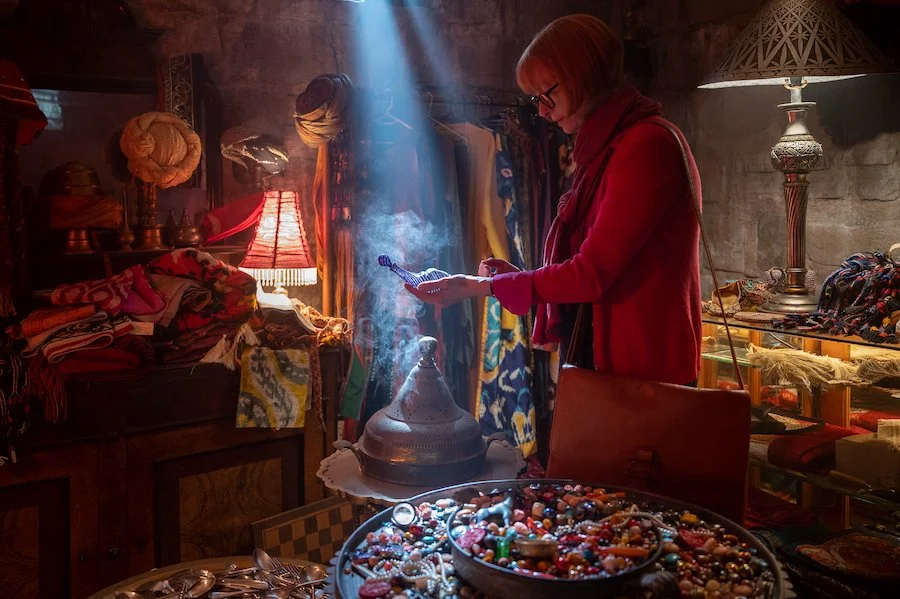Millennial Angst
The unofficial Idris Elba film festival kicks off with the latest by ‘Mad Max’ guru George MIller, with less lunacy than expected.
Three Thousand Years of Longing
Director: George Miller • Writers: George Miller, Augusta Gore, based on the short story by AS Byatt
Starring: Tilda Swinton, Idris Elba, Aamito Lagum, Ece Yüksel, Burcu Gölgedar, Matteo Bocelli, Kaan Guldur, Jack Braddy, Pia Thunderbolt, Anna Adams
Australia/USA • 1hr 48mins
Opens Hong Kong September 1 • IIB
Grade: C+
Perhaps it’s because the script is based on Booker Prize-winner AS Byatt’s dense, metaphorical, feminist The Djinn in the Nightingale's Eye that Three Thousand Years of Longing seems like it’s bursting at the seams – even as it confines itself to a restrictive hotel room for huge chunks of its action. There are hints of director George Miller’s overactive imagination all over the screen, starting with the opening frames where literary scholar Alithea Binnie (Tilda Swinton) has a moment in Istanbul airport involving an imp, passes out at her speaking engagement, then buys a funky glass bottle that has a djinn inside it. And in all honesty it’s a film you really, really, really want to like; that you want to place alongside this year’s other great fantasy, Everything Everywhere All at Once. But this is not Miller’s most cohesive work, colourful and evocative, though it may be. Built very nearly like an anthology given its disjointed narrative and sometimes clumsy connections, Three Thousand Years is a film you wish was better than it is rather than anything worthy of actively disliking.
After she picks up the aforementioned bottle in a souk, Alithea breaks it open while cleaning it, releasing the Djinn (Idris Elba) living inside it. He tells her he is “at her bidding” and then begs her to make three wishes so that he can be released from his otherworldly prison. But she insists she has no heart’s desires – she’s happily solitary by choice – and even if she did, making wishes come true can have dire consequences. The Djinn seems to concur, regaling her with stories of his three millennia of conquered kingdoms and failed romances, and the two spend the morning in hotel bathrobes verbally sparring over the nature of love, the value of storytelling (like cinema), freedom, isolation and sacrifice among other heady emotional subjects.
The Djinn’s great romances and wish receivers included the Queen of Sheba (Aamito Lagum, luminous), Zefir (Burcu Gölgedar), a brilliant intellectual, and a sultan’s concubine, Gulten (Ece Yüksel), who plans to heir her way out the harem. Each time the Djinn’s devotion blew up in his face and he wound up back in an ampoule of some sort. Miller and Augusta Gore’s (Miller’s daughter) screenplay sands the harder edges about women trapped by the rule and rules of men off Byatt’s story, rendering Alithea simply an eccentric academic instead of the symbol of a different kind of confinement for the Djinn.
A lot happens in Three Thousand Years but not much actually “happens.” Each of the Djinn’s stories are laced with a delicate sadness the lingers just beneath he surface of cinematographer John Seale and production designer Roger Ford’s almost surreal visual palette, each frame loaded with the kind of detail we’ve come to expect from the mad genius Miller. He doesn’t construct pictures, they’re compositional statements. Can you ever unsee the cherry dining scene from The Witches of Eastwick? But there’s also something uncharacteristically low energy and, well, empty about what is essentially an adult fairy story. That’s not on either Elba or Swinton, both of who go all in with what they’ve got to work with, particularly when the story heads back to Alithea’s home in London and takes a turn for the aimless. Why are her intolerant neighbours there? Melancholy lingers, but Three Thousand Years is not sad. Miller’s humour makes brief appearances, but it’s not funny. There’s a meta examination of the role of narrative in our lives but it’s not thought-provoking. Miller has put his singular, wild imagination up on screens for enough years now to earn a bit of whimsical experimentation within the confines of COVID, and the film will find an audience. But, really, it’s time to get busy with Furiosa, George. Please? — DEK



